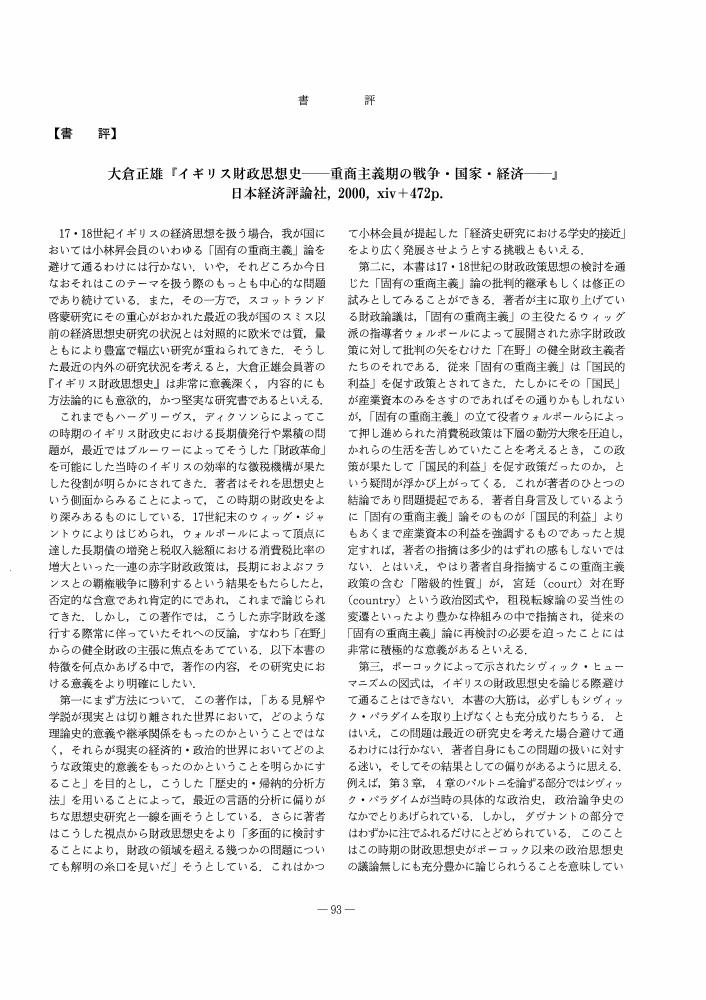6 0 0 0 OA 書評
2 0 0 0 OA 政治算術とホッブズの時代
- 著者
- 伊藤 誠一郎
- 出版者
- The Japanese Society for the History of Economic Thought
- 雑誌
- 経済学史学会年報 (ISSN:04534786)
- 巻号頁・発行日
- vol.41, no.41, pp.80-89, 2002 (Released:2010-08-05)
- 参考文献数
- 31
In considering the reasons why W. Petty devised political arithmetic and why C. Davenant, though critical of it, inherited it, it seems too easy to define political arithmetic simply as a practice of gathering numbers or general quantification. Political arithmetic indeed contained its own polemical and political issues, which are impossible to understand without considering its intellectual and socio-economic context. Recent studies have shown that the skepticism and instability of society, as described and presented by Thomas Hobbes, were the essential factors characterizing the society of early modern England. Hobbes and the early political arithmeticians lived in the same milieu; one characterized by instability and fear. In such a society it was hard to reach consensus about what was the truth or accurate knowledge. R. Tuck and C. Muldrew demonstrated how Hobbes tried to overcome this deeply penetrating skepticism by means of political realism and legal authority. S. Shapin and S. Shaffer insisted that in seventeenth century England, what was ‘truth’ was not self-evident, but had to be made clear through the artificial process of the gentlemen's society. Some other elaborate studies on the classical rhetoric of Renaissance England suggested it was doubtful that the abuse of rhetorical skill might distort knowledge, and, on the other hand, that the intellectuals of that time, including Hobbes, must have tried to persuade the audience, using rhetoric as one means to do so. This instability concerning knowledge in early modern England explains the background that political arithmeticians shared with their contemporaries. They sought to acquire more ‘accurate’ quantified data to use for the mercantile policy. J. Brewer and M. Okura set this new method of gathering numbers in the context of international conflict, in which it was used as a means to gain more relative power. To extend their political, economical, and military power, the mercantile states needed more useful and trustworthy information. This involved political arithmetic; knowledge gathering in this context was inherently political from its birth. Neither Petty nor Davenant constructed it solely to support purely scientific Baconian philosophy. They created it and used it with clear tactical intent. Thus, it is implied that there was more behind the birth of political arithmetic than Baconianism and so called civic humanism. For example, classical republicanism was just a part of humanism, which has multiple aspects, including Tacitism and classical rhetoric. In addition to Baconianism, there were various attempts to challenge epistemological and moral-political skepticism.
1 0 0 0 OA 書評
1 0 0 0 OA 書評
1 0 0 0 OA 書評
1 0 0 0 OA 書評
- 著者
- 伊藤 誠一郎
- 出版者
- 経済学史学会
- 雑誌
- 経済学史研究 (ISSN:18803164)
- 巻号頁・発行日
- vol.60, no.2, pp.119-120, 2019 (Released:2019-10-14)
1 0 0 0 OA Mercantilism reimagined or redefined?
- 著者
- 伊藤 誠一郎
- 出版者
- The Japanease Society for the History of Economic Thought
- 雑誌
- 経済学史研究 (ISSN:18803164)
- 巻号頁・発行日
- vol.58, no.1, pp.139-148, 2016 (Released:2019-08-31)
- 著者
- 伊藤 誠一郎
- 出版者
- 経済学史学会
- 雑誌
- 経済学史研究 (ISSN:18803164)
- 巻号頁・発行日
- vol.56, no.1, pp.157-159, 2014 (Released:2019-08-24)
- 著者
- 伊藤 誠一郎
- 出版者
- The Japanease Society for the History of Economic Thought
- 雑誌
- 経済学史研究 (ISSN:18803164)
- 巻号頁・発行日
- vol.54, no.2, pp.74-76, 2013 (Released:2019-10-31)
1 0 0 0 OA 経済ナショナリズムと国家理性論についての再検討 『貿易の嫉妬』にみるリアリズムの意味
- 著者
- 伊藤 誠一郎
- 出版者
- 経済学史学会
- 雑誌
- 経済学史研究 (ISSN:18803164)
- 巻号頁・発行日
- vol.53, no.2, pp.76-99, 2012 (Released:2019-08-22)
In Jealousy of Trade (2005), I. Hontʼs “realism” involves both a warning against understanding The Wealth of Nations as a product of the two idealisms of “civic-humanism” and natural juris-prudence, and an attempt to apply “Machiavel-lism,” or the perspective of reason of state, to the history of the world trade economy. However, when one puts Hontʼs argument in the context of Machiavellian political discussion, such as that of F. Meinecke, R. Tuck, and W. F. Church, it becomes clear that all of these scholarsʼ realistic understanding of the European history of ideas entails the description of the idealʼs history, in terms of progress towards it, rather than its re-nunciation. Specifically, Meinecke finds his ide-al in reason of enlightenment, Tuck in peace, Church in morality, and Hont in “cosmopolitical economy.” Nevertheless, each views the ideal in terms of its tension with historical reality. In contrast, H. Takemoto and T. Nakano, unencum-bered by such European idealism, seek a realis-tic political economy if in different ways while disregarding the ideal. For these two thinkers, reality is not a temporal hindrance that will eventually be overcome, but rather what contin-uously and permanently is. Hence, T. Nakano argues that an ongoing governmental industrial policy is a necessary measure to protect the nation and society, and H. Takemoto finds in The Wealth of Nations something like a political economy of order and safety. JEL classification numbers: B 11, B 49, Y 30.
- 著者
- 伊藤 誠一郎
- 出版者
- 経済学史学会
- 雑誌
- 経済学史研究 (ISSN:18803164)
- 巻号頁・発行日
- vol.49, no.2, pp.82-83, 2007-12-25 (Released:2010-08-05)
- 著者
- 伊藤 誠一郎
- 出版者
- 経済学史学会
- 雑誌
- 経済学史学会年報 (ISSN:04534786)
- 巻号頁・発行日
- vol.40, no.40, pp.93-94, 2001 (Released:2010-08-05)









